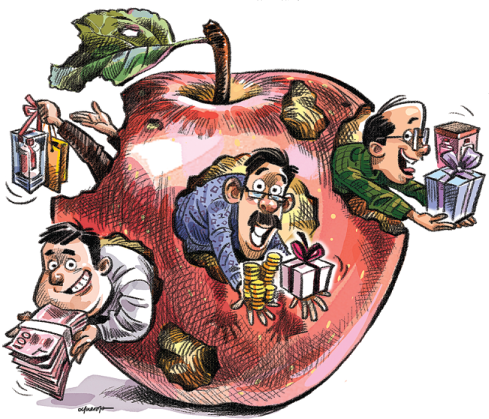End 'graft subculture' to build a healthier society
Updated: 2016-03-05 08:36
By Li Fangchao(China Daily)
|
||||||||
 |
| Li Min/China Daily |
A man in Central China's Henan province tried, in vain, for four months to get a hukou (household registration) for his newborn son from a local public security bureau. He then presented 200 yuan ($31) to the police officer in charge of the matter and, within two days, got the registration completed.
Another man, just released from prison, said he had to give presents to the guards from time to time to avoid being harassed by them in prison. And a senior official in Nan'an, South China's Fujian province, got an earful from his wife for failing to use his connections to get his son admitted to a "better" school.
The three cases mentioned in a recent report of China Disciplinary Inspection and Supervision News, the official publication of the country's top anti-corruption watchdog, are quite common in everyday life. The report also said a type of "corruption subculture", which thrives on "hidden rules", permeates society.
Stories of doctors receiving hongbao, or red envelopes containing gift money, from patients for a surgery are no longer news nor are tales of candidates showering examiners with gifts to get a driving license. The "corruption subculture", like "spiritual smog" covering every aspect of life, is eroding the normal order of society.
When most people believe that by following the normal procedure they cannot get even routine things done and, hence, resort to bribing officials or using their connections, it means something is seriously wrong with the existing social norms.
The central leadership has launched an unprecedented anti-corruption drive, which has brought down a large number of "tigers and flies", or high-ranking and lower-level corrupt officials. Indeed, the leadership is determined to clean the Party and government, but it should pay attention to the "corruption subculture" too.
If people grow up in a culture in which the use of money as "social lubricant" is rampant, taking bribes and favors by officials will become an accepted practice. The source of the "corruption subculture" is unchecked powers of officials.
Grassroots police officers, prison guards and doctors may not be important enough to be called even "flies", but it is the resources they have at their disposal that make abuse of power possible. The money or presents they demand or take may not be big enough to land them in jail, but bit by bit they will continue to contribute to the "corruption subculture", which will lead to greater and more damaging corruption.
While people are infuriated to see the appalling facts after a corrupt official is caught, how many can say they haven't done anything to help corruption flourish? People who bribe officials to get things done and thus become part of the "corruption subculture" risk violating law themselves. One has to ask oneself: Do you have the will to resist temptation? Or, will you become corrupt if you get the opportunity?
This "corruption subculture" cannot be eradicated if people continue to involuntarily follow the "hidden rules" to get things done.
The top leadership has vowed to keep power "within the cage" of systematic regulations. It has also been pushing forward the work of streamlining administrative approval processes to cut red tape to reduce the power of the government, a move applauded by all. But strengthened supervision for people who exercise power is also essential for preventing abuse of power.
Moreover, public resistance to these "hidden rules" is also necessary to eradicate corruption.
The fight against corruption is high on the agenda of the deputies to the National People's Congress and members of the National Committee of the Chinese People's Political Consultative Conference attending the twin annual sessions in Beijing. The deputies and members, who hail from all walks of life and from across the country, can play a leading role in finding ways to end the "corruption subculture" once and for all.
The writer is an editor of China Daily. lifangchao@chinadaily.com.cn
- Global health entering new era: WHO chief
- Brazil's planning minister steps aside after recordings revelation
- Vietnam, US adopt joint statement on advancing comprehensive partnership
- European border closures 'inhumane': UN refugee agency
- Japan's foreign minister calls A-bombings extremely regrettable
- Fukushima impact unprecedented for oceans: US expert

 Stars of Lijiang River: Elderly brothers with white beards
Stars of Lijiang River: Elderly brothers with white beards
 Wealthy Chinese children paying money to learn British manners
Wealthy Chinese children paying money to learn British manners
 Military-style wedding: Fighter jets, grooms in dashing uniforms
Military-style wedding: Fighter jets, grooms in dashing uniforms
 Striking photos around the world: May 16 - May 22
Striking photos around the world: May 16 - May 22
 Robots help elderly in nursing home in east China
Robots help elderly in nursing home in east China
 Hanging in the air: Chongqing holds rescue drill
Hanging in the air: Chongqing holds rescue drill
 2.1-ton tofu finishes in two hours in central China
2.1-ton tofu finishes in two hours in central China
 Six things you may not know about Grain Buds
Six things you may not know about Grain Buds
Most Viewed
Editor's Picks

|

|

|

|

|

|
Today's Top News
Liang avoids jail in shooting death
China's finance minister addresses ratings downgrade
Duke alumni visit Chinese Embassy
Marriott unlikely to top Anbang offer for Starwood: Observers
Chinese biopharma debuts on Nasdaq
What ends Jeb Bush's White House hopes
Investigation for Nicolas's campaign
Will US-ASEAN meeting be good for region?
US Weekly

|

|







